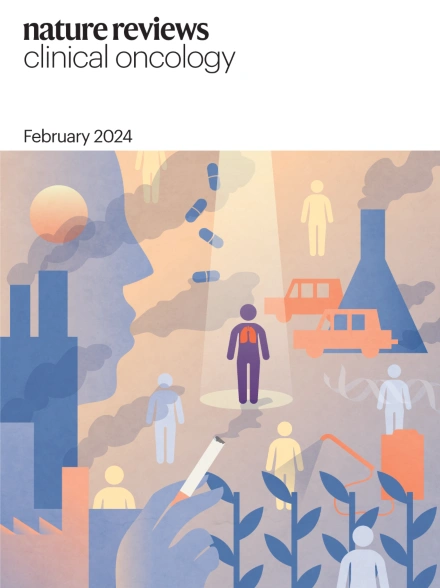不可切除的III期非小细胞肺癌:现状和挑战。
IF 82.2
1区 医学
Q1 ONCOLOGY
引用次数: 0
摘要
尽管免疫疗法取得了进展,但不可切除的III期非小细胞肺癌(NSCLC)仍然是一种极具挑战性的疾病,只有约三分之一的患者在5年内保持无病状态。PACIFIC试验将同步放化疗后抗pd - l1抗体durvalumab作为标准治疗方法。此外,LAURA试验重新定义了III期不可切除egfr突变NSCLC患者的治疗方法,显示了奥西替尼巩固后前所未有的无进展生存期。尽管取得了这些进展,但迫切需要新的方法。基于循环肿瘤dna的最小残留疾病监测正在成为定制治疗时间和升级策略的个性化方法。新的放射治疗技术具有与免疫治疗协同作用的潜力,同时将毒性降到最低。此外,在不久的将来,正在进行的评估新辅助环境下的化学免疫治疗组合转化为可切除疾病的可能性的试验可能会重新定义手术可切除性的界限。在这篇综述中,我们描述了快速发展的不可切除的III期NSCLC领域,提供了一个最新的概述,包括具有挑战性的主题,如生物标志物,治疗的个性化和免疫治疗再挑战的作用。本文章由计算机程序翻译,如有差异,请以英文原文为准。
Unresectable stage III non-small-cell lung cancer: state of the art and challenges.
Despite advances in immunotherapy, unresectable stage III non-small-cell lung cancer (NSCLC) remains a highly challenging disease, with only around one-third of patients remaining disease-free at 5 years. The PACIFIC trial established consolidation with the anti-PD-L1 antibody durvalumab after concurrent chemoradiotherapy as the standard-of-care approach. Furthermore, the LAURA trial has redefined the treatment of patients with stage III unresectable EGFR-mutant NSCLC, demonstrating unprecedented progression-free survival durations with osimertinib consolidation. Despite these advances, novel approaches are urgently needed. Circulating tumour DNA-based monitoring of minimal residual disease is emerging as a personalized method of tailoring treatment duration and escalation strategies. Novel radiotherapy techniques have the potential to provide synergy with immunotherapy while minimizing toxicities. Additionally, ongoing trials evaluating chemoimmunotherapy combinations adapted from the neoadjuvant setting with the potential for conversion to resectable disease might, in the near future, redefine the boundary of surgical resectability. In this Review, we describe the rapidly evolving field of unresectable stage III NSCLC, providing a state-of-the-art overview that includes challenging topics such as biomarkers, personalization of therapy and the role of immunotherapy rechallenge.
求助全文
通过发布文献求助,成功后即可免费获取论文全文。
去求助
来源期刊
CiteScore
99.40
自引率
0.40%
发文量
114
审稿时长
6-12 weeks
期刊介绍:
Nature Reviews publishes clinical content authored by internationally renowned clinical academics and researchers, catering to readers in the medical sciences at postgraduate levels and beyond. Although targeted at practicing doctors, researchers, and academics within specific specialties, the aim is to ensure accessibility for readers across various medical disciplines. The journal features in-depth Reviews offering authoritative and current information, contextualizing topics within the history and development of a field. Perspectives, News & Views articles, and the Research Highlights section provide topical discussions, opinions, and filtered primary research from diverse medical journals.

 求助内容:
求助内容: 应助结果提醒方式:
应助结果提醒方式:


